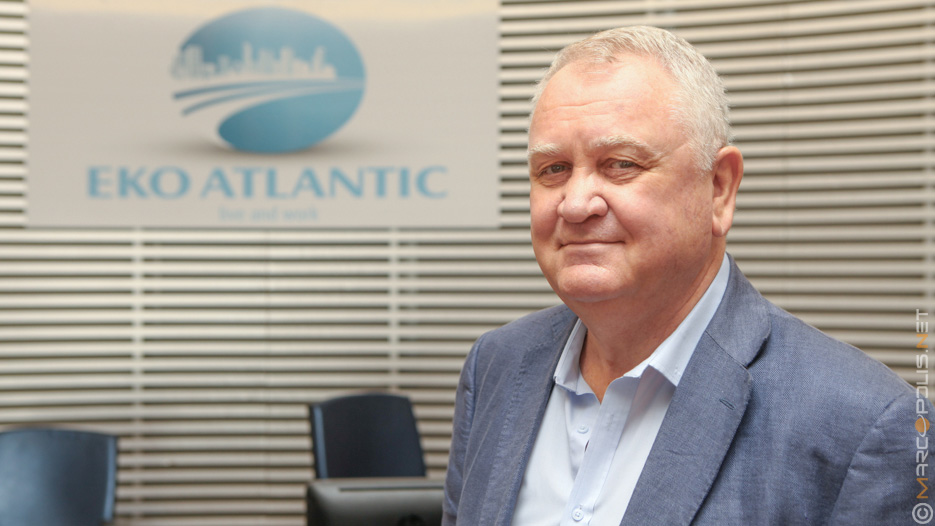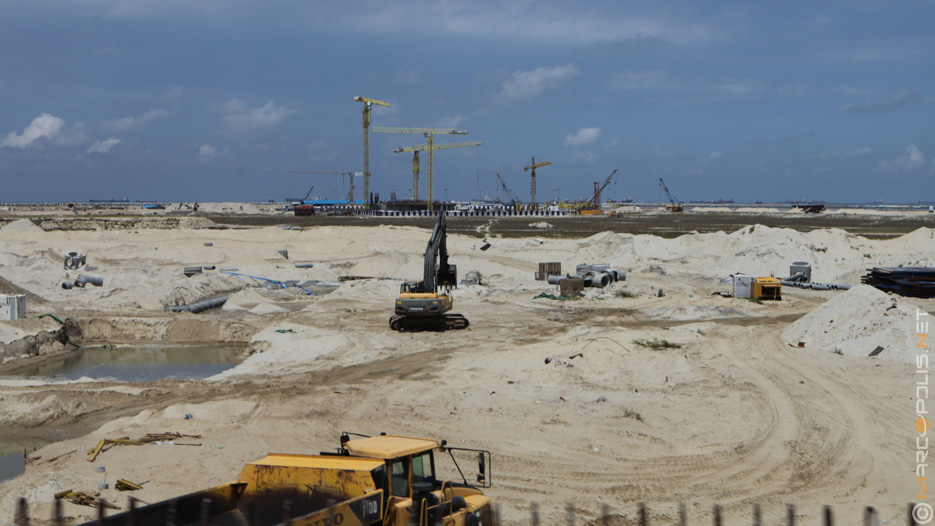Leading Real Estate Development in Nigeria: Eko Atlantic
“We like to think that we will do better than Dubai.”
Interview with David Frame, Managing Director of Eko Atlantic

How would you describe the construction/real estate market in Nigeria? What trends have you been witnessing so far in 2016?
We have to first look at the trends over the past two or three years. It’s been very positive. What does stand out very clearly is a lack of A-grade office space. Commercial activity is expanding and they are not finding the office space that they need. There has been development of new projects particularly in Ikoyi and Victoria Island and to a lesser extent in Lekki and those projects are starting to come online. It still doesn’t come close to meeting the numbers that are required. This is an area where emphasis needs to be placed and this is why we feel that Eko Atlantic will provide the necessary real estate that is required. The situation in this year clearly has been affected by the global turn down in the oil price. That is inevitable and it is world-wide. It is starting to come back however. The signs are that now that it has reached the magical $50 a barrel mark and up then the growth will start to come through again.
What is the origin of the idea behind the Eko Atlantic development?
We have to go back to the turn of the century. It was one of the pledges of the incoming Governor, Governor Tinubu in 1999. He wanted to find a permanent solution for the erosion of Bar Beach which is on the Atlantic coast of Victoria Island. There had been aggressive erosion of that coastline over the previous 100 years to the extent that the existence of Victoria Island was under severe threat. Once the Governor came into office he ordered a detailed report. That report came out in 2002 and we were approached by Governor Tinubu in 2003 to look at that report and come forward with some practical suggestions on how the protection could be achieved. Since 2003 we have studied the engineering, the economy, what it would cost to execute the work and over time we developed what you see today. Ten million square meters of land reclaimed from the sea and Victoria Island permanently protected which was in line with the brief from Governor Tinubu. Now we had the platform for a huge expansion of the commercial retail and residential accommodation in Victoria Island and its surroundings. It was a progressive thing. It evolved over time but we had a very strong plan for the future and we had a lot of investment in the project from various areas as well as benefiting the development of Lagos state and Nigeria and without incurring any cost from government. The government are not investing in this project. It is purely financed from private funds. That means a net benefit for the government in supporting the Eko Atlantic project.
We like to think that we will do better than Dubai.
We have heard that the project is being compared to Dubai. What will it be like?
We like to think that we will do better than Dubai. Dubai grew out of a somewhat artificial concept in a country with a very low population. We all know the history behind the development in Dubai. However the realities of Victoria Island and Lagos were that there was a shrinking area available for further development, particularly for commercial activity. Without the reclamation of Bar Beach that commercial activity was shifted extensively along the Lekki corridor which is very limited and is already reaching a stage where it is almost saturated. Other areas available are to the west through [Brodagre] but that is some distance outside of the central Lagos metropolis. It’s very important that the existing commercial areas of Lagos are in close proximity to the expansion that we are achieving with the Eko Atlantic project.

Tell us some specific features of Eko Atlantic. What is going to be the most outstanding about it?
What we are doing is creating a platform for the development of commercial activity. To that end we have identified a central business district that is 700,000 square meters in area. Some people consider that this will be our equivalent of 5th Avenue in New York or if you prefer the European analogy the Champs Elysees in Paris. It’s approximately two kilometres in length. It’s has a central carriage way that is sixty meters wide. On either side of that we have very wide generous walkways that are fourteen meters wide. This will allow a lot of interaction between all the commercial companies in the financial district. We will have buildings of 30 to 35 stories on either side. However there will be a mix use concept. You will have retail outlets too. We are looking very clearly at the planning of those areas and we have identified the first two stories of each structure to have a retail outlet. It can be retail shops, bars, coffee shops or restaurants. This is because we recognize that in a financial district there is a lot of face to face interaction between people who are collaborating on various projects. For this reason we want this mix use concept which is the theme throughout the entire Eko Atlantic. It will be a very vibrant place with round the clock 24 hours activity which is what we want to achieve. Now apart from the commercial financial district we have to the south west corner one million square meter of land that is devoted to the marina district. This is one of two marinas. This one is in the south west corner. The second is in the far eastern extent of the project. The concept here is to develop a marina. It is 300 meters in diameter so it’s a large marina. It accommodates a large number of vessels ranging from 6 meters to 20 meters in length. Around that we will have high rise buildings. 30 to 35 storeys typically that will be devoted to high level residential development but there will also be opportunities for hotels and at the lower levels there will be opportunities for retail. It is very much a theme that will encourage tourism. That is another goal of both the state and federal government. To encourage and expand the tourism industry in Nigeria and Lagos in particular.
At what construction stage are you at the moment?
You can say that approximately 60% of the reclamation part of the project and the sea wall that protects it is complete. Within that area of six square kilometres we have extensively developed the infrastructure. That is the roads and bridges. We have fifteen bridges within Eko Atlantic phase one and two and we are working on the last bridge right now. The other fourteen are complete. We are developing a canal system which links the two marinas and also acts as a conduit for transportation via water. This is also something that is important to the Lagos state government. The road works contain 56 kilometres of road within phase one and two which represents half the project. We are well past 50% complete on that set up. We are also putting in place the utilities. There is power. We will generate power for the project. Distribute power throughout the project via cable all underground. There won’t be any overhead lines that can be affected by storm conditions. Water supply is next. We will take up water from deep wells and keep it to World Health Organization standards and distribute that in underground pipes networked throughout the underground city. We will also have a sewerage collection system. This too will be underground and it will reflect the requirements of the World Health Organization with regards to the treatment of sewerage in a metropolis environment and the effluent will be to the World Health Organization standards. In addition to all that we will have an extensive network of ducting which will accommodate the fibre optic network. All the IT services that you would expect in a modern city will be provided by a fibre optic network system.
It is indeed a massive undertaking. What are your expectations? What would you like to see happen? What do you want to bring into the market?
I’ve been a resident of Lagos for the past 28 years and during that period I have seen the highs and the lows. Prior to 2000 development was stifled. But since 2000 there has been recognition that we need to realise the true potential of Lagos. I believe that the Lagos state government are succeeding in many ways to achieve that goal. They are looking at many avenues in terms of the improvement of transport systems and so forth. One of these improvements was the recent announcement of the signing of a MOU for the fourth mainland bridge. It is a very important project for the development of the city. It will free up a lot of traffic that currently has to pass through Ikoyi and Victoria Island on route to Lekki or from the mainland across the Lekki. There has been significant improvement. There is one thing that does stand out. The commercial development of Lagos has been frustrated by the sheer lack of land in order to achieve that expansion. Eko Atlantic provides that footprint. Ten million square meters of land. That is almost double the size of the existing Victoria Island. It’s a significant expansion of land. And within that period of the development of Eko Atlantic in the early stages from 2003 up till now people are starting to see the true potential of Eko Atlantic. For me it is very exciting to see the concept realised. To meet the requirements of the Lagos state government and the concept of Governor Tinubu and succeeding governors who have followed him in supporting the project and realising that it will open up the potential of Lagos as a commercial entity. It will be a hub for the continent of Africa and the further development of commercial and industrial activity with the development deep water port in Lekki, the expansion of the road network, the introduction of light rail schemes. I can see the future for Lagos being very bright and it truly will be a remarkable city.
FAIR USE POLICY
This material (including media content) may not be published, broadcasted, rewritten, or redistributed. However, linking directly to the page (including the source, i.e. Marcopolis.net) is permitted and encouraged.